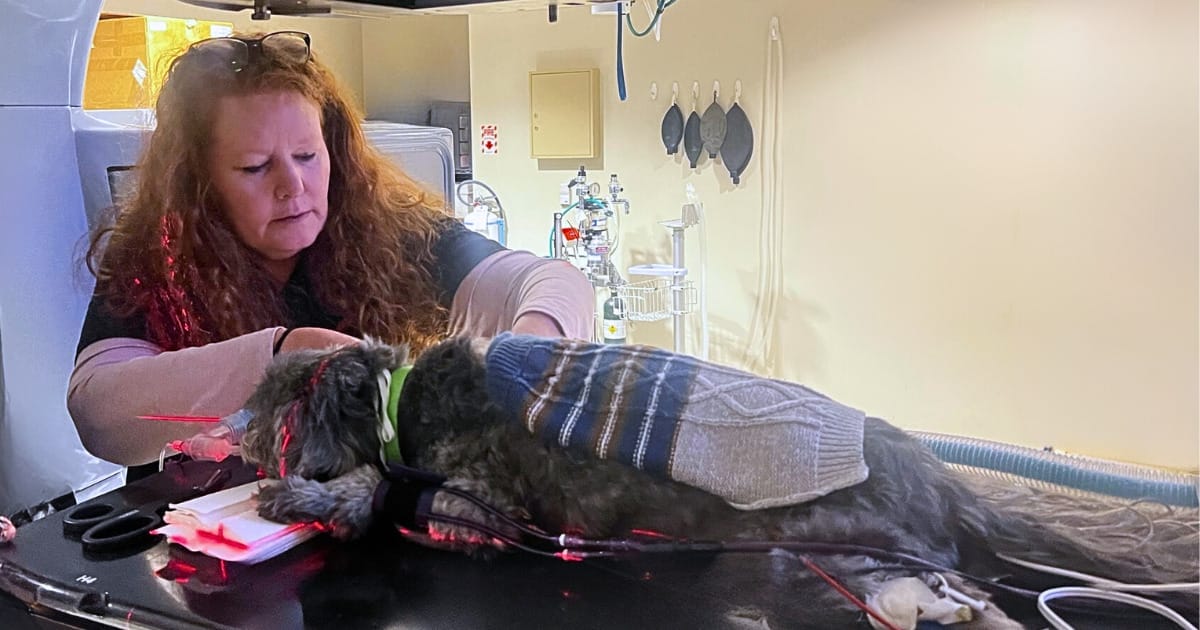Veterinary Radiation Oncology
Why Choose MedVet Radiation Oncology
Our radiation oncology team members, most of whom are board-certified, are experts in their field. With our collaborative approach, our veterinary specialists focus on improving each patient’s quality of life through palliative and curative-intent or definitive care, with a variety of services for each. We work with you, your family veterinarian, and additional MedVet specialists, such as the surgery, medical oncology, and pain management teams, to provide exceptional care for your pet.
In our state-of-the-art facilities, your pet receives the most advanced therapies and procedures from a team consistently at the forefront of radiation treatment, research, and technology. Our team and facilities are renowned for delivering the most effective and personalized cancer treatment available for pets. This experience and expertise make us a preferred partner for many family veterinarians.
This service is currently offered in our Columbus, Cincinatti, and Salt Lake City hospitals.
- Bone tumors
- Brain tumors
- Nasal tumors
- Oral cavity tumors
- Skin and subcutis tumors
- Soft tissue sarcomas
What to Expect During a Radiation Oncology Treatment
Radiation therapy is generally done over several appointments in small doses and usually lasts 15-30 minutes. Your pet is put under short-acting anesthesia as they must remain still so radiation is delivered to the affected cells with minimal effect on surrounding healthy tissue. Your pet can typically go home the same day after treatment.
Radiation therapy can cure some pets’ cancer. For others, it may reduce the size of their tumor and help relieve pain to make them more comfortable. Many cats and dogs tolerate radiation therapy well. Others may experience some short-term or permanent side effects. Your doctor will discuss the possibilities with you.
- 3D radiation planning
- Cancer treatment
- Canine and feline radiation treatment
- Intensity-modulated radiation therapy
- Linear accelerator
- On-board imaging
- Pain management
- Stereotactic radiation therapy
- Volumetric modulated arc therapy
Also known as “definitive RT,” this provides long-term tumor control. Treatment is often combined with surgery and/or chemotherapy. It usually involves your pet receiving one treatment session per day, Monday through Friday, for three to four weeks. Your pet may need a CT scan to help with treatment planning.
Also known as “coarse fractionated RT,” this works to improve or maintain quality of life. Palliative RT typically requires one visit per week over a three- to six-week period. It is typically the most financially feasible treatment option and is used in a wide variety of situations. Your pet may need a CT scan for treatment planning.
This uses one to five treatment sessions to deliver a high dose of radiation to a bulky tumor, while accurately sparing the immediately surrounding normal tissues. This is a highly precise radiation therapy that requires a CT scan for radiation treatment planning.
Not all services are available in every hospital. Contact your local MedVet for services at that location.
Radiation Oncology Resources
View All Radiation Oncology Resources
Radiation Oncology
Six Questions with a Specialty Leader: Radiation Oncology

Radiation Oncology
Six Questions with a Specialty Leader: Radiation Oncology

Radiation Oncology
Stereotactic Radiation Therapy (SRT) FAQs

Radiation Oncology
Stereotactic Radiation Therapy (SRT) FAQs

Radiation Oncology
Radiation Therapy in Dogs and Cats
